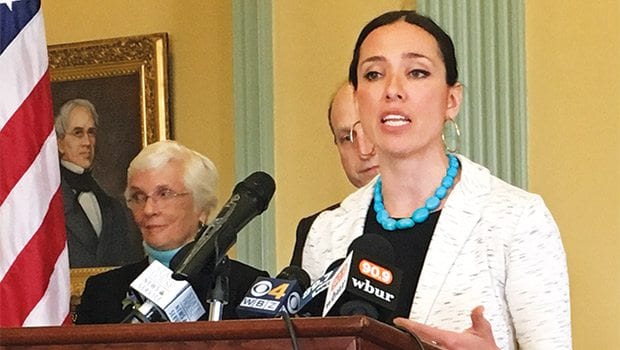Boston lawmakers, advocates continue pushing for criminal justice reform
Advised to delay policy asks for a reform study; many say study is over, and wait too must end

At Boston’s annual Martin Luther King Day memorial breakfast, state Sen. Sonia Chang-Diaz broke with tradition, giving a speech that turned evocations of King’s legacy into a demand for action on criminal justice reform. Quoting King’s warning that the word “wait” often turns into the word “never,” Chang-Diaz said the time has come for state leadership to stop delaying action on policies that could reduce racial disparities in incarceration.
On the web
Coalition for Public Safety letter: https://aclum.org/wp-content/uploads/2017/01/20170117-CSG-Letter.pdf
Sen. Sonia Chang-Diaz’s speech: https://www.facebook.com/BayStateBanner/videos/10154968560229452/
“For the past four-and-a-half years of my eight years as a lawmaker, we have been told by the big three leaders of the state legislature and executive branch on Beacon Hill to wait,” Chang-Diaz said.
Members of the state Black and Latino Legislative Caucus, activists and many other community members long have sought measures such as repeal of mandatory minimum sentencing for nonviolent drug offenses. The measure has racially disparate impact, results in higher than necessary prison populations and can make parole less effective because fewer people are eligible, many advocates say.
Attempts by lawmakers to enact legislative reforms often have been met with the advice to wait until the initiatives could be folded into a more comprehensive reform package, Chang-Diaz said, specifically, until the national nonprofit Council of State Governments (CSG) could analyze Massachusetts’ criminal justice system and provide policy recommendations.
In late December, when the CSG held its final scheduled working group session, it became clear that racial disparities were never assigned as a study focus. Activists organized by Jobs Not Jail marched out in the middle of the meeting to protest the study’s limited scope and the lack of representation of people of color in the CSG group.
“While we were expecting our leaders to finally make good on their promises, word got out that the [CSG’s] final analysis was not going to touch on the issues of sentencing reform or racial bias that we had been told was coming,” Chang-Diaz said. “Scores of black and brown protestors demonstrated at the final public meeting of the council. But they were told blankly by the all-white panel of appointed experts that were there that sentencing reforms were never part of their charge.”
Her speech drew cheers and applause.
Momentum builds
The Council on State Governments has yet to present bills for filing, giving many hope that there is still time to influence the anticipated criminal justice policy package.
State Rep. Russell Holmes said Chang-Diaz’s comments may have helped move criminal justice issues forward with state leadership. In his quarterly meeting with the Black and Latino Legislative Caucus last Thursday, Governor Charlie Baker said he would consider reforms to bail and probation fees, which many see as placing an undue burden on low-income defendants.
Bail reform advocates say that such fees can mean low-income individuals are held pretrial solely due to their financial limitations, not their flight risk. Being detained may cause individuals to fall behind on rent and utility payments, miss work and be unable to pick up children from school or support their families — all while there is yet to be a ruling on their guilt.
When legislators pressed Baker about mandatory minimum sentences for minor drug trafficking offenses, he said that only between 350 and 400 people are currently serving mandatory sentences for those offenses.
Holmes said Caucus members pushed back.
“We asked him to go back and see how many cases were initially charged with mandatory minimums before being pleaded down to a lesser charge,” he said.
Baker agreed to look into this.
That figure is significant, as there is concern that some defendants may be persuaded to plead guilty to smaller charges when presented with the threat of being charged with an offense that carries a mandatory sentence.
“I appreciated that he had some research done before the meeting,” Holmes said. “He was very articulate, very knowledgeable about it.”
Holmes said the Caucus members asked Baker to include provisions reducing mandatory minimums in his legislation, rather than having Caucus members file amendments.
Advocates’ letter
Another push comes from a coalition of about 70 advocacy groups that on Jan. 17 sent a letter to four of the five local CSG steering committee members.
In the letter, sent to Baker, Supreme Judicial Court Chief Ralph Gants, House Speaker Robert DeLeo and Senate President Stanley Rosenberg, the Coalition for Effective Public Safety requested an end to mandatory minimums, bail fee reform, more diversion initiatives to prevent people from becoming incarcerated in the first place, compassionate release of prisoners so ill they are no longer a threat, and enough rehabilitative and educational programming to meet demand and to prepare prisoners to be successful post-incarceration.
The coalition also sought steps to ensure prisoners are not held under higher levels of security than is necessary and to increase parolee counts — for instance by granting parole based on the individual’s behavior and progress, not on the nature of their original defense, and by instituting presumptive parole policy in which parole is not granted by board, but rather automatically assigned once the minimum sentence is served, unless the individual has lost this privilege.
Some of these recommended actions can be enacted executively, without waiting for legislation, the coalition stated. In its letter, the coalition made appeals to public safety and to financial practicality, noting that recidivism and high prison populations are a drain on taxpayer money.
In an additional move, Chang-Diaz also is refiling a reform bill that includes eliminating mandatory minimum drug sentences, raising the threshold at which larceny becomes a felony from $250 to $1,500 and creating provisions for medical-need based parole.
Yawu Miller contributed to this article.






